# 1. Mount Desert, Maine
Little is known about this small etching, which was likely one of Colman’s first. It is listed in Sylvester Rosa Koehler’s 1880 article about Colman, which describes it as “from nature.” It also appears in the catalogue of an 1881 exhibition at the Museum of Fine Arts Boston. Today the museum holds the only known impression, which was acquired as part of a gift from the artist in 1885.
Mt. Desert is an island northeast of Colman’s hometown of Portland, Maine. A plein air watercolor of Mt. Desert, also dated 1877, was sold at Grogan and Company in 2019 and may be from the same visit to the island.
# 2. Old Mill, East Hampton, Long Island
This etching is mentioned in Sylvester Rosa Koehler’s 1880 article about Colman, as well as in two articles referencing exhibitions in New York (1879) and London (1881).
In 2025, a copy was sold at South Bay Auctions inscribed with the title, the word “Proof”, and the artist’s signature.
Colman would return to the subject of a mill on Long Island again with East Hampton, Long Island and Old Mill at Wainscott, Long Island.
# 3. Farm-yard, East Hampton, Long Island
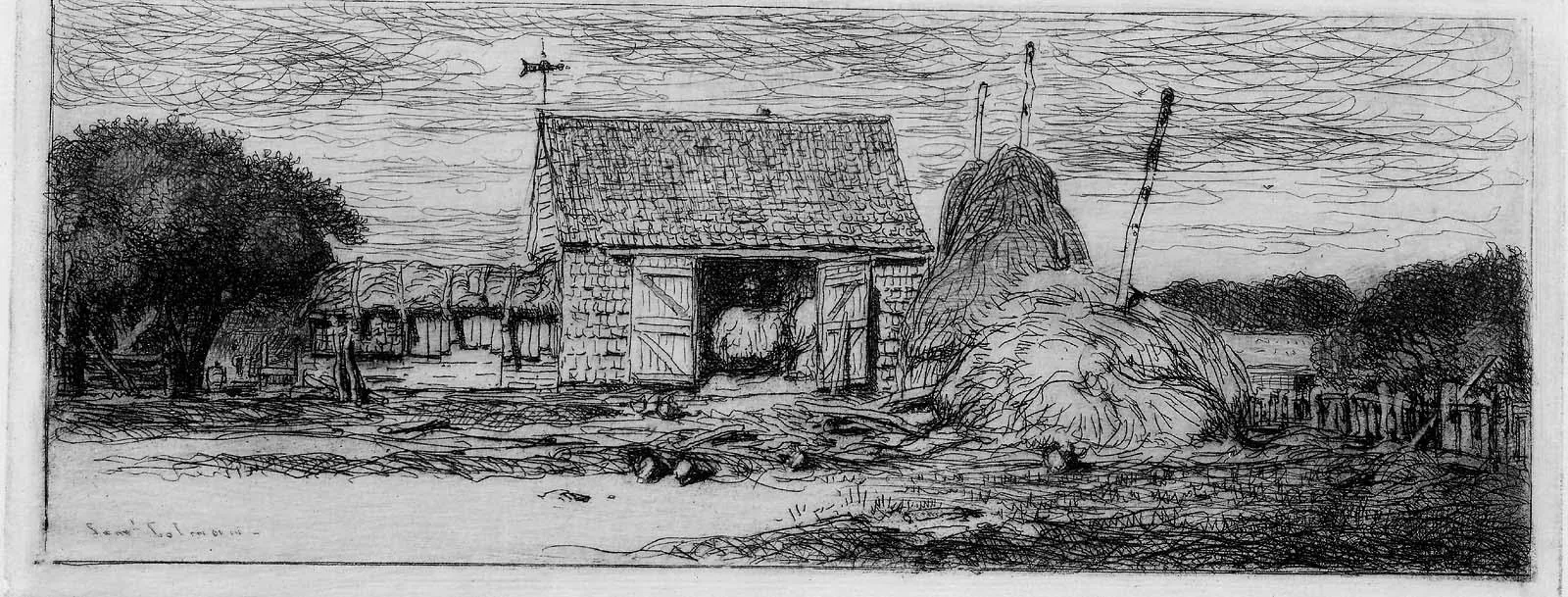
It’s likely this is the etching described only as “Etched from Nature” in the 1881 exhibition of the British Society of Painter Etchers. It was also exhibited at the 1891 exhibition of the New York Etching Club where it was similarly described as “etched from nature”. The Museum of Fine Arts Boston holds the only known copy, which they refer to as “Barn Yard at East Hampton, Long Island”.
While there is no way to conclusively date this image, it seems verwy likely to have been made at the same time as Old Mill, East Hampton, Long Island and Untitled [Farmyard with Ducks], which appears to depict the same location.
# 4. The Lake Side
This nondescript etching exists in only one public collection: the Rona and Martin Schneider Collection at Syracuse University Art Museum. Two other copies have been seen for sale online. Syracuse University Art Museum dates it to 1882, but it must be earlier since it is mentioned in Samuel Rosa Koehler’s article about Colman from 1880. The content of that article suggests it may have been created in 1877 when Colman “etched several more plates from nature.” All known copies are hand-signed, suggesting it was never published.
A prepatory sketch for this drawing is in the Cooper Hewitt. It is inscribed “Below the Maple masses meet.”
# 5. Untitled [Farmyard with Ducks]
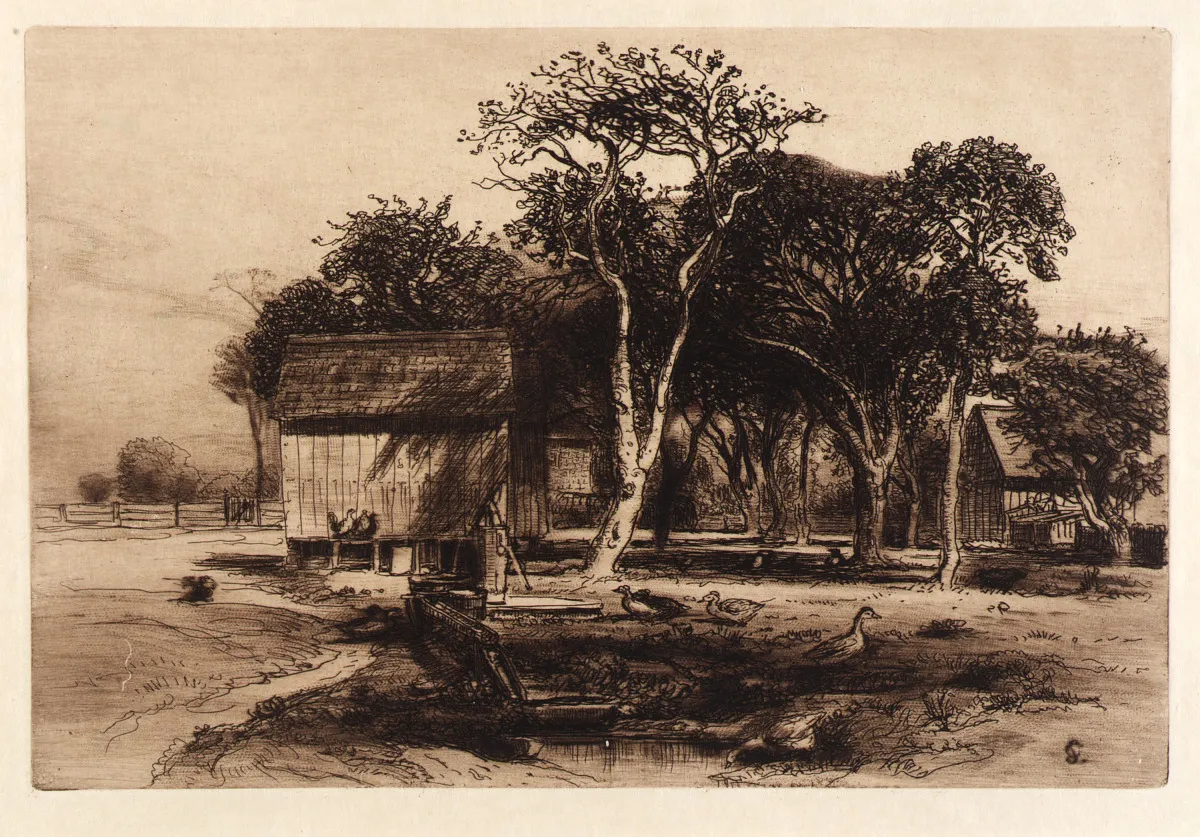
It’s very likely this etching of ducks in a farm yard is the third of three etchings of Long Island that Colman exhibited together in the 1881 exhibition of the British Society of Painter Etchers — most likely the one referred to as “Long Island Study”.
While there is no way to conclusively date this image, it seems likely all three etchings of Long Island were made around a similar time.
# 6. Pacific Coast, California
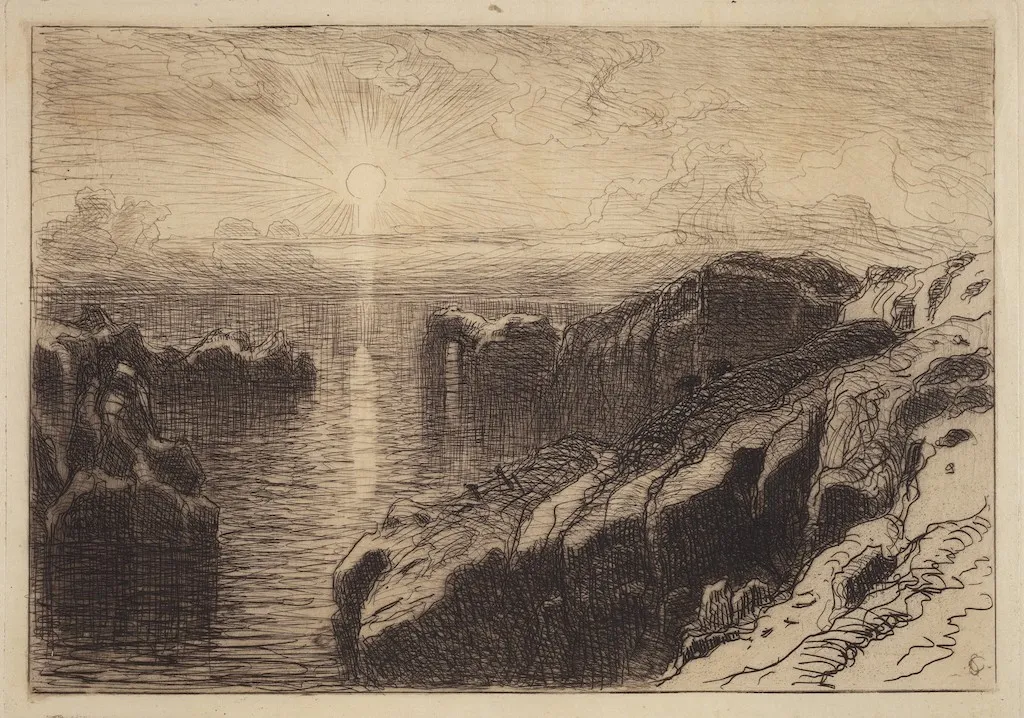
Colman probably drew this scene during his first trip to California in 1870 and etched it later in the decade. Of his early etchings, it is one of the most evocative and a significant example of his sinuous style of landscape drawing.
Colman seems to have been particularly proud of this etching. It was exhibited at The British Society of Painter-Etchers (1881), the Museum of Fine Arts Boston (1881), and The New York Etching Club (1882).
An undated, preparatory sketch for the etching is in the Cooper Hewitt.
# 49. Stirling Castle
This etching is mentioned in an 1880 letter from Colman to Sylvester Rosa Koehler where he offers either “the plate of Stirling Castle” or “the Durham subject” for publication in American Art Review. Stirling castle was also exhibited in 1879 at the Brooklyn Art Association and in 1880 with the American Watercolor Society.
# 7. A Cloudy Day in Venice
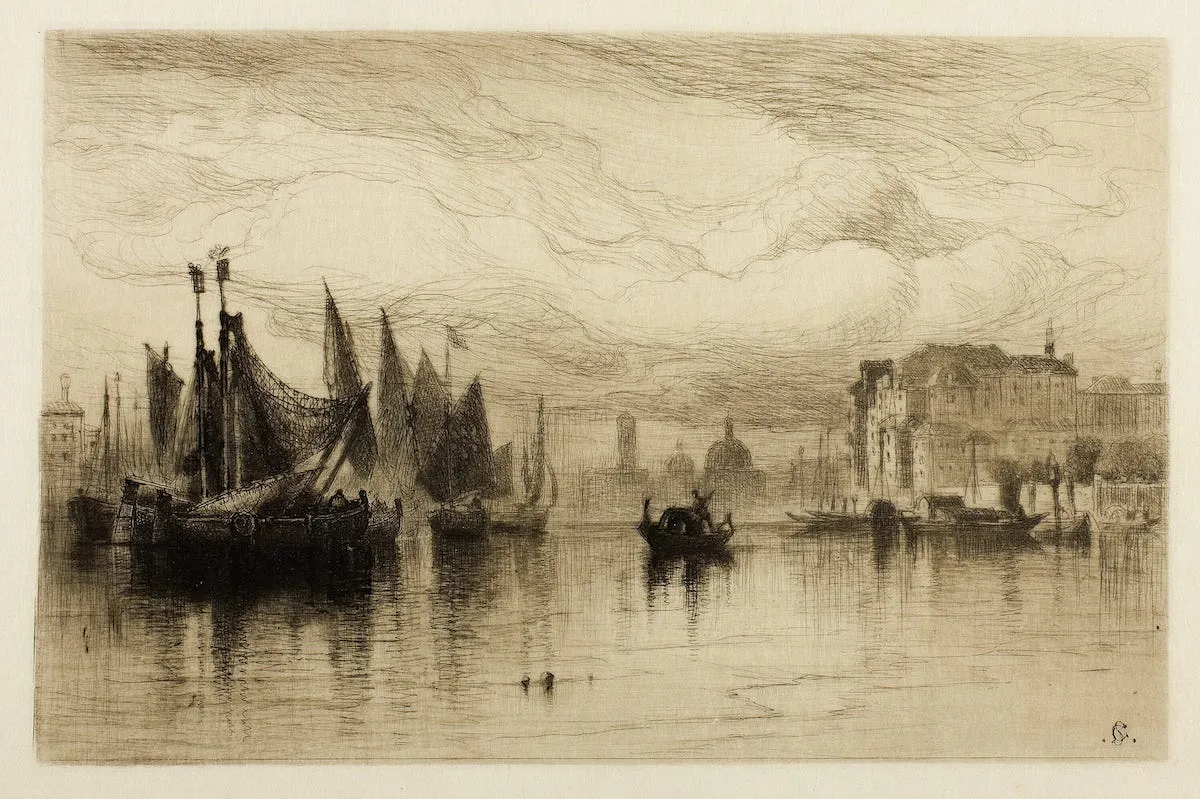
- Original Etchings by American Artists. New York: Cassell & Company, 1883
- Gems of American Etchers. New York: Cassell & Company, 1885
- The Cleveland Museum of Art
- Museum of Fine Arts Boston
- National Academy of Design
- University of Iowa Stanley Museum of Art
- Syracuse University Art Museum (as published)
- Syracuse University Art Museum (trial proof)
This is the only one of Colman’s etchings known to survive in many states. The Museum of Fine Arts Boston holds a series of eight working proofs donated by art historian Sylvester Rosa Koehler. Koehler was the editor of the Original Etchings by American Artists, where this etching was first published, and also authored a brief, but important article about Colman in The American Art Review. Another signed proof is at the Syracuse University Art Museum.
# 8. Durham, England (The Splendor Falls on Castle Walls)
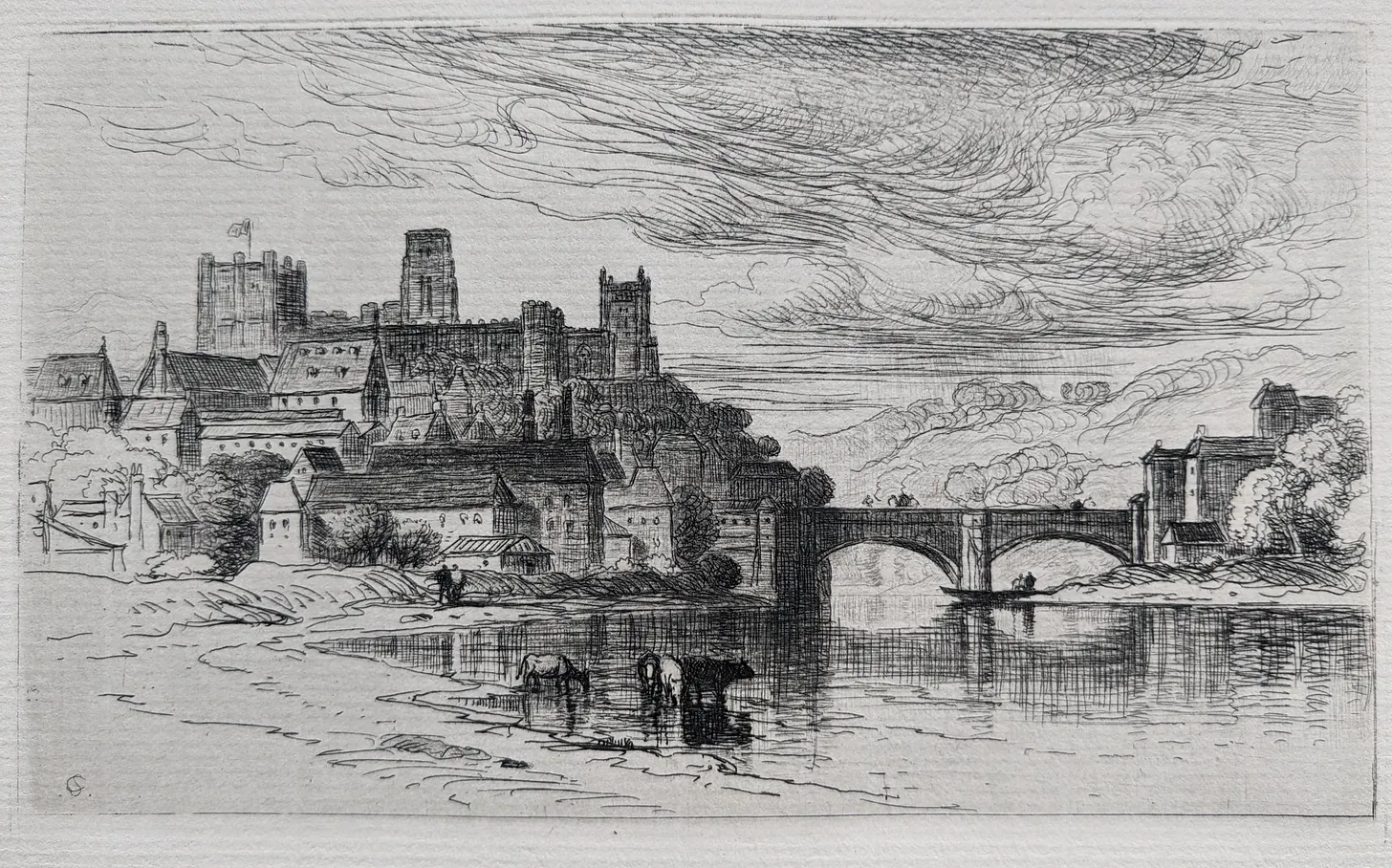
- The American Art Review, vol. 1, no. 9 (1880).
- Nature and Art: Poems and Pictures from the Best Authors and Artists. Boston: Estes and Lauriat, 1882.
- American Art and American Art Collections, vol. 2. Boston: E.W. Walker & Company, 1889.
- Charles Hosmer Morse Museum of American Art
- Fine Arts Museums of San Francisco
- Harvard Art Museums
- Metropolitan Museum of Art
- Museum of Fine Arts Boston
- National Gallery of Art
- Pennsylvania Academy of the Fine Arts
- Syracuse University Art Museum
- Syracuse University Art Museum (hand-signed)
- University of Iowa Stanley Museum of Art
- Yale University Art Gallery
This picturesque view of Durham Castle was Colman’s response to commmission from Sylvester Rosa Koehler to create an etching for American Art Review. Koehler was a major booster of Colman’s work and rhapsodized his etchings in the accompanying article as “among the most interesting of the works so far produced by the etchers of America.” This etching was subsequently republished in two other volumes, making it by far Colman’s most widely circulated image.
# 31. East Hampton, L.I.
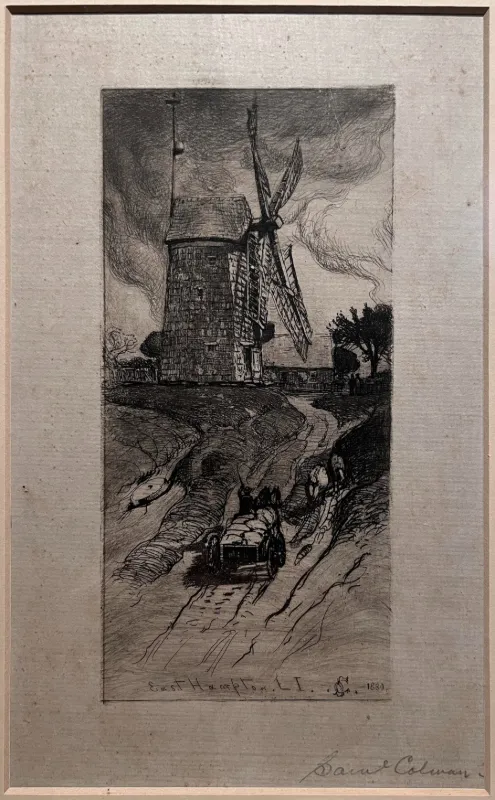
This etching is known from a single impression in the collection of Clark Weinreb. It echoes the subject of one of Colman’s earliest etchings, Old Mill at East Hampton, Long Island, as well as Old Mill at Wainscott, Long Island.
# 46. Amsterdam, Holland
This etching is known from Sylvester Rosa Koehler’s 1880 article as well as the exhibition catalogue for an 1881 exhibition at the Museum of Fine Arts Boston. No copies have been located.
# 14. Japanese Inro and Netsukes
Colman was an avid collector of Asian decorative objects, including prints, pottery, and Japanese netsuke (carved button fasteners) and inro (small boxes to be hung from a sash). In 1880 Colman wrote to Sylvestor Rosa Koehler that he was making “a series of etchings now from some of my art objects.”
Unfortunantely, exactly how many etchings he made is a extremely difficult to discern. Colman was never consistent with naming his etchings and limited detail in the exhibition history makes it difficult to know which names refer to the same prints:
- In 1881: “Japanese Incense Burner” and “The Sacred Bean, Japanese Inro”
- In 1884: “Japanese Inro and Netsukes”
- In 1893: “Japanese Inro with Netzukies” and “Japanese Inro with Netzukies (No. 2)“
- In an 1894 article: “Japanese Inro and Netsuke”
Further confusing things, the Museum of Fine Arts Boston has unphotographed etchings catalogued under the titles “Japanese Inro and Netsukes”, “Japanese Netsukes”, and “Japanese Inro”, all dated 1880. Presumably these are the same three prints catalogued here, but it’s difficult to be certain.
# 15. Japanese Inro
# 47. Rotterdam, Holland
This etching is known from Sylvester Rosa Koehler’s 1880 article as well as the exhibition catalogue for an 1881 exhibition at the Museum of Fine Arts Boston. No copies have been located.
# 48. The Market at Amsterdam
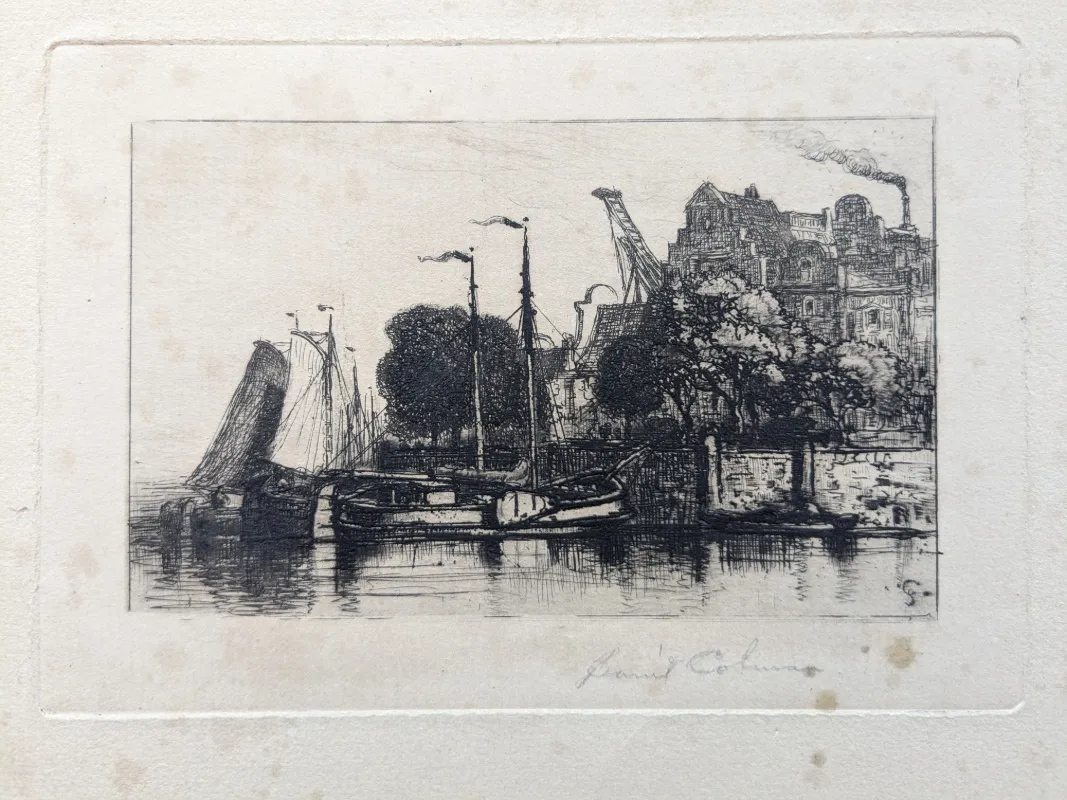
The only known copy of this etching is in the collection of the author of this catalogue. The title is inscribed in the author’s hand. No other records have been located.
# 9. Untitled [Wooded Landscape]
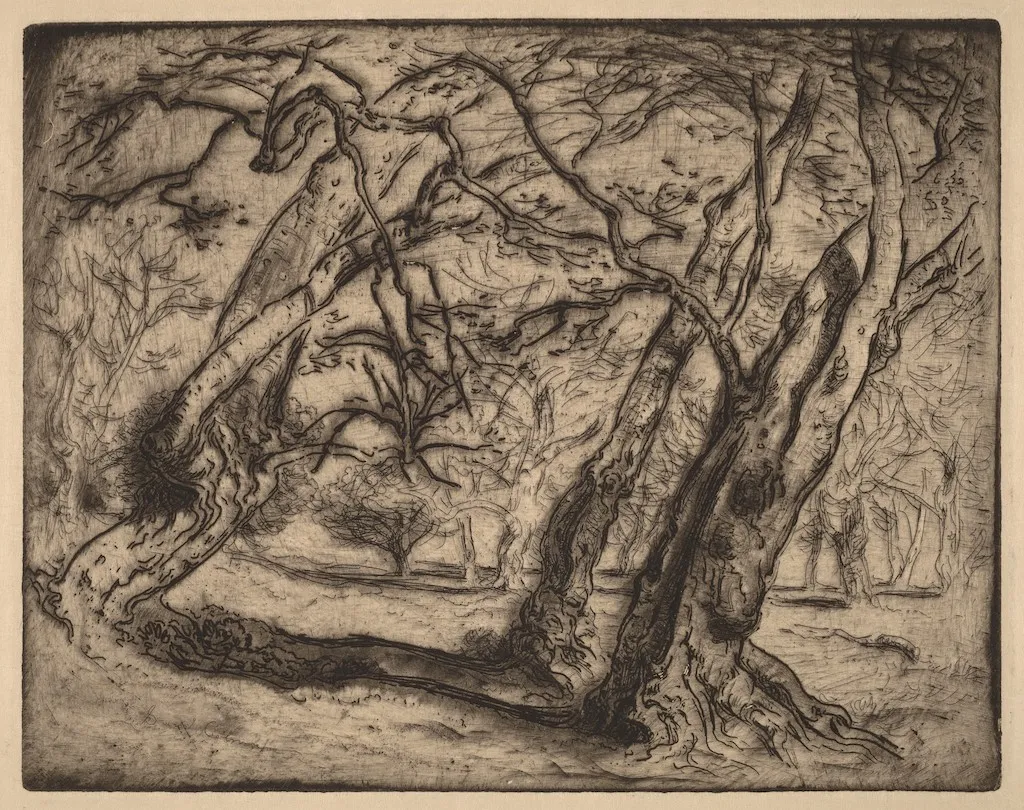
The National Gallery of Art holds two state of this etching. The second state also includes scattered paint marks that appear to be Colman’s edits. It’s unknown if any subsequent states exist that incorporate these changes.
# 10. Amalfi [Gate]
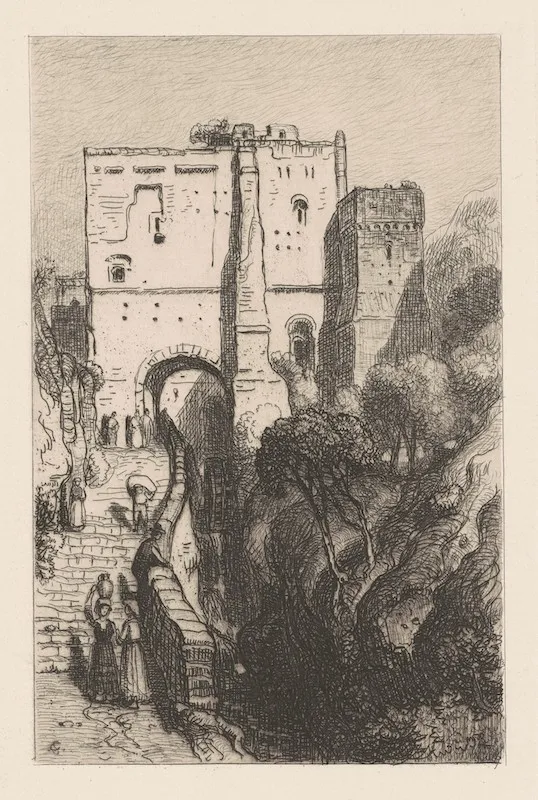
- Poets and Etchers. Boston: James R. Osgood, 1882.
One of four etchings included in Poets and Etchers, an important, early book that brought together etchings created by members of the New York Etching Club with poems from important American poets.
# 11. Amalfi [Harbor]
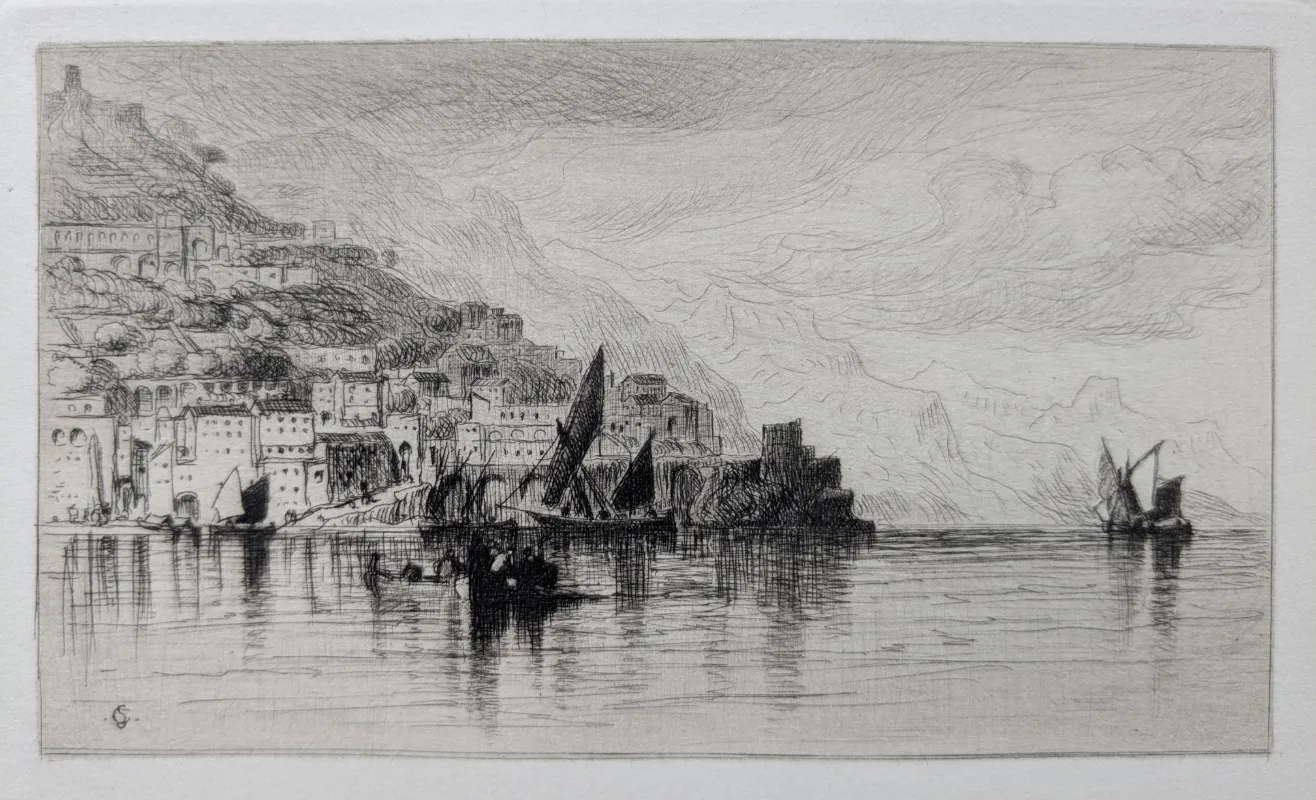
- Poets and Etchers. Boston: James R. Osgood, 1882.
One of four etchings included in Poets and Etchers, an important, early book that brought together etchings created by members of the New York Etching Club with poems from important American poets.
# 12. The Belfry at Bruges
- Poets and Etchers. Boston: James R. Osgood, 1882.
One of four etchings included in Poets and Etchers, an important, early book that brought together etchings created by members of the New York Etching Club with poems from important American poets.
# 13. Coblenz
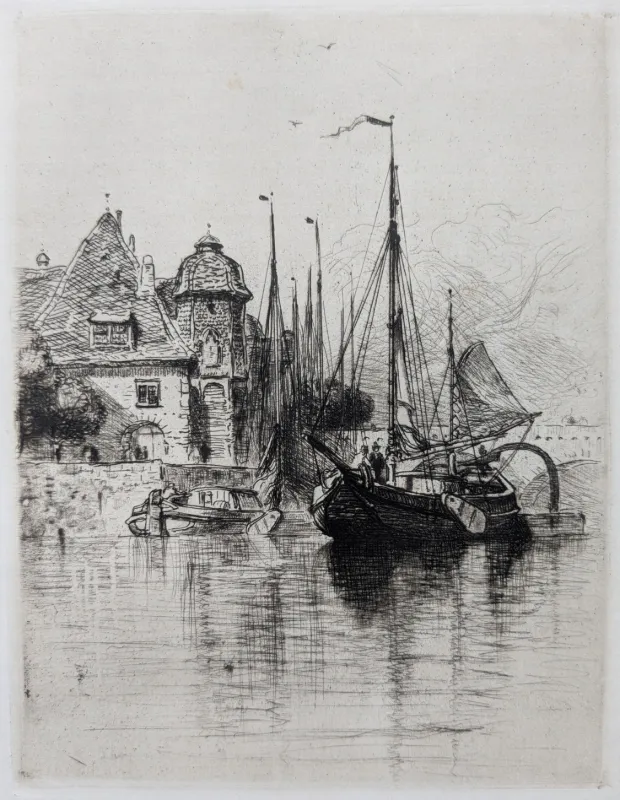
This etching is the subject of an 1885 letter Colman wrote to “Mrs. Moran.” (Presumably Mary Nimmo Moran, a fellow etcher and wife of Thomas Moran, who was a close friend and traveling companion.) It is likely based on a drawing from Colman’s tour of Europe in the 1870’s.
The etching was later published, at least once, in Germany by Wien Verlag der Gesellschaft für vervielfältigende Kunst. (The Society for Reproducing Art) The exact volume in which it was published remains unknown.
# 17. Moorish Cafe, Algeria
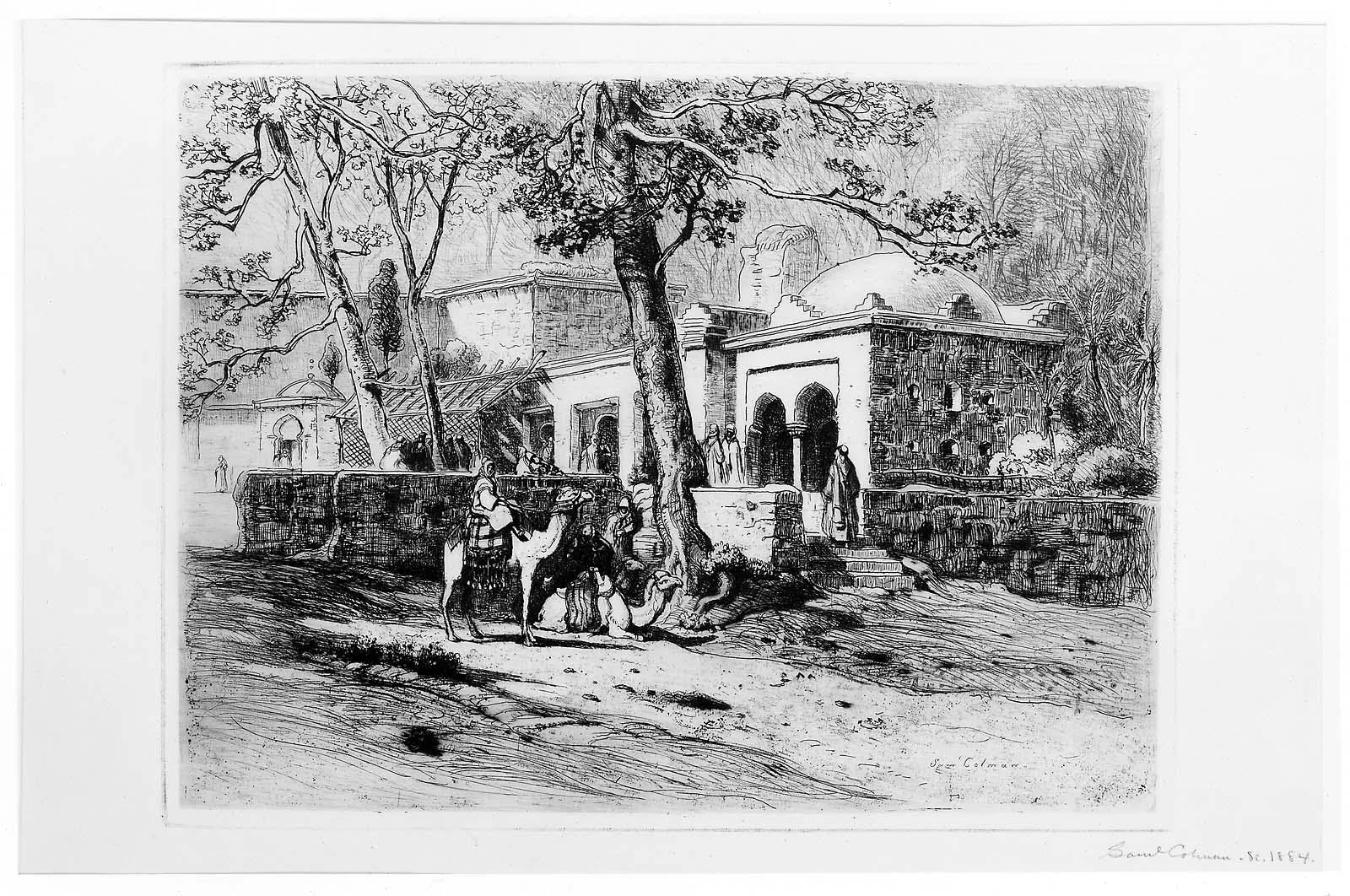
The impression of this etching held by the Museum of Fine Arts Boston was gifted by artist in 1885. No other copies have been located.
# 20. The Olive Trees of the Riviera
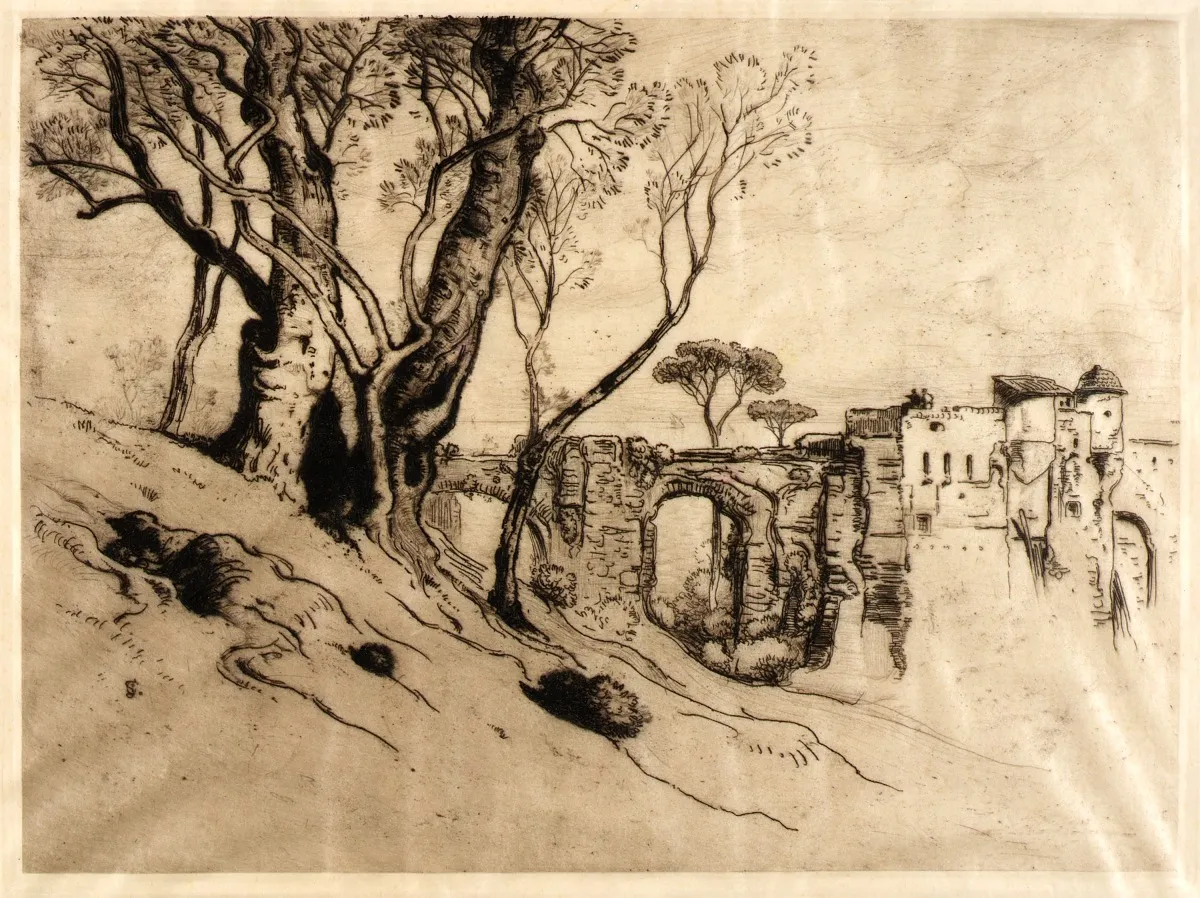
- Twenty Original American Etchings: Published under the auspices of the New York Etching Club. New York: Cassell & Company, 1884
- Gems of American Etchers. New York: Cassell & Company, 1885
- The Cleveland Museum of Art
- The Cleveland Museum of Art
- Minneapolis Institute of Art
- Museum of Fine Arts Boston
- National Academy of Design
- Natioanal Academy of Design
- National Gallery of Art
- Pennsylvania Academy of Fine Arts
- Syracuse University Art Museum (first state)
- Syracuse University Art Museum (second state)
- University of Iowa Stanley Museum of Art
# 21. On the River at Antwerp
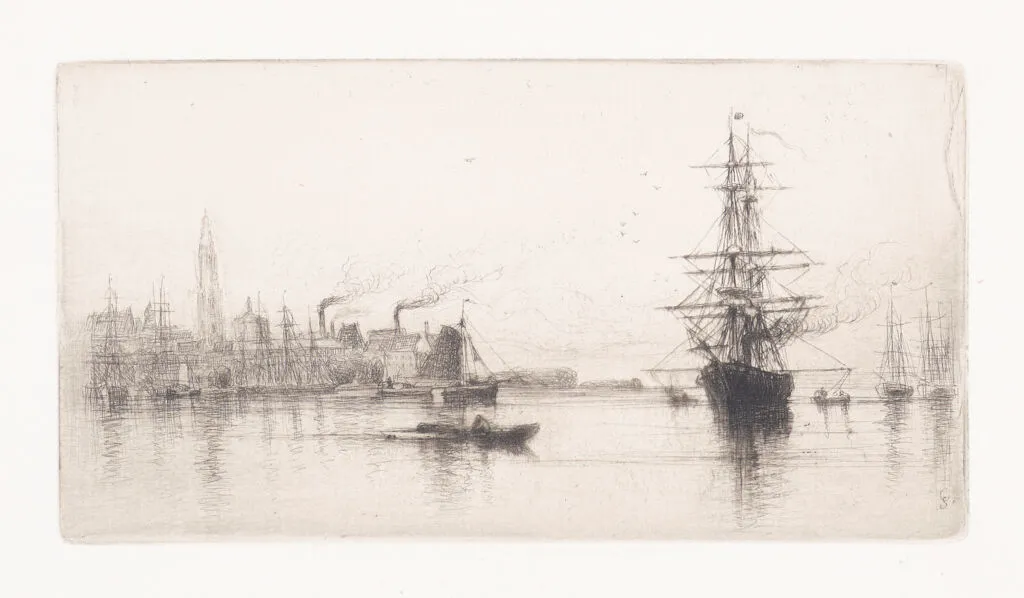
- Catalogue of the New York Etching Club Exhibition: New York: The Studio Press, 1884.
- Ackland Art Museum
- High Museum of Art
- Metropolitan Museum of Art
- Metropolitan Museum of Art
- Museum of Fine Arts Boston
- University of Iowa Stanley Museum of Art
- Syracuse University Art Museum
# 18. Olive Grove & Mill, San Remo
Colman refers to this etching as Olive Grove & Mill, San Remo in 1891 and Olive Grove & Mill, Bordighera, Italy in 1893. The Syracuse University Art Museum refers to it as Old Mill in the Riviera Valley, though the origin of this name is unknown.
Olive Trees of the Riveira appears to be a related scene.
# 19. Old Mill at Wainscott, Long Island
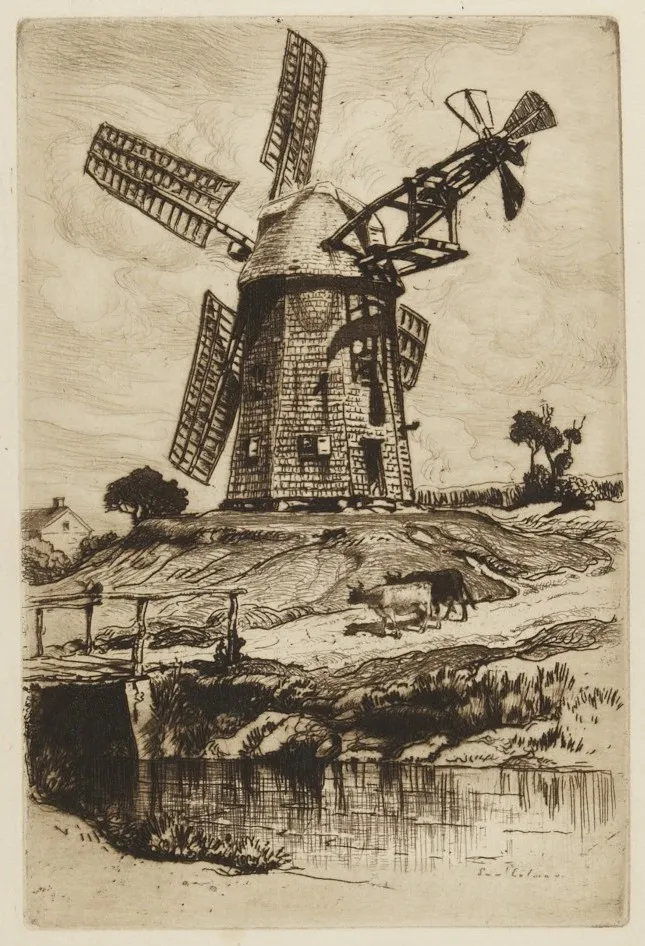
- The Etcher's Folio. Philadelphia: H.F. Richter Publishing Company, n.d.
- High Museum of Art ("Old Mill at Wainscott, Long Island")
- Minneapolis Institute of Art ("An Old Mill at Wainscotte, L.I.")
- Museum of Fine Arts Boston ("No. 1. Old Mill, Wainscott, L.I.")
- National Academy of Design ("An Old Saw Mill at Wainscott, L.I.")
- Princeton University Art Museum ("Wainscott Windmill")
For reasons that are not immediately obvious, this etching has a different name in every museum collection where it is found. It should also not be confused with the similarly named Old Mill, East Hampton, Long Island and East Hampton, L.I..
The folio from which this etching originates is exceedingly rare. Only one copy could be located in any American institution and it appears to be incomplete. The date of publication is also unclear, but it must have been prior to 1885 when Colman gave a copy of this etching to the Museum of Fine Arts Boston.
# 22. The Pont de Gand, Bruges
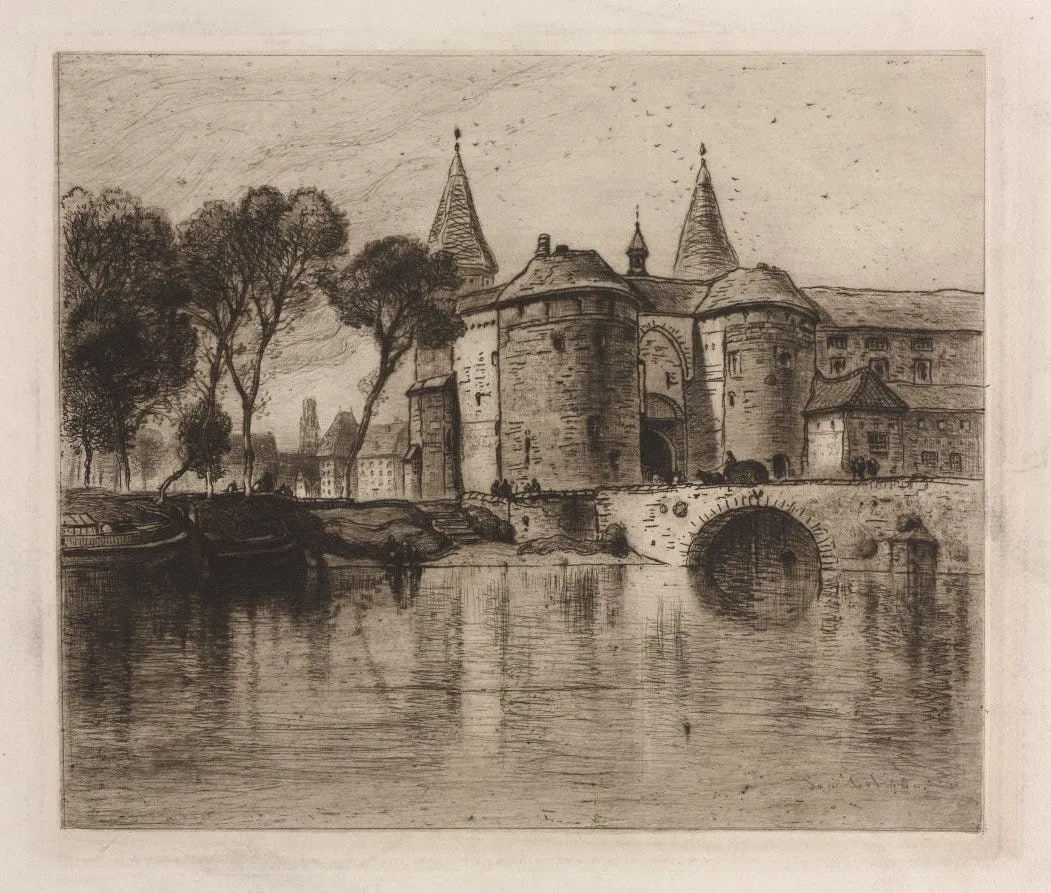
- Selected Etchings by American Artists. Philadelphia: H.F. Richter & Company, 1884.
- The Cleveland Museum of Art
- Museum of Fine Arts Boston
- National Academy of Design
- Syracuse University Art Museum
- Tacoma Art Museum
# 23. The Boompjes, Rotterdam
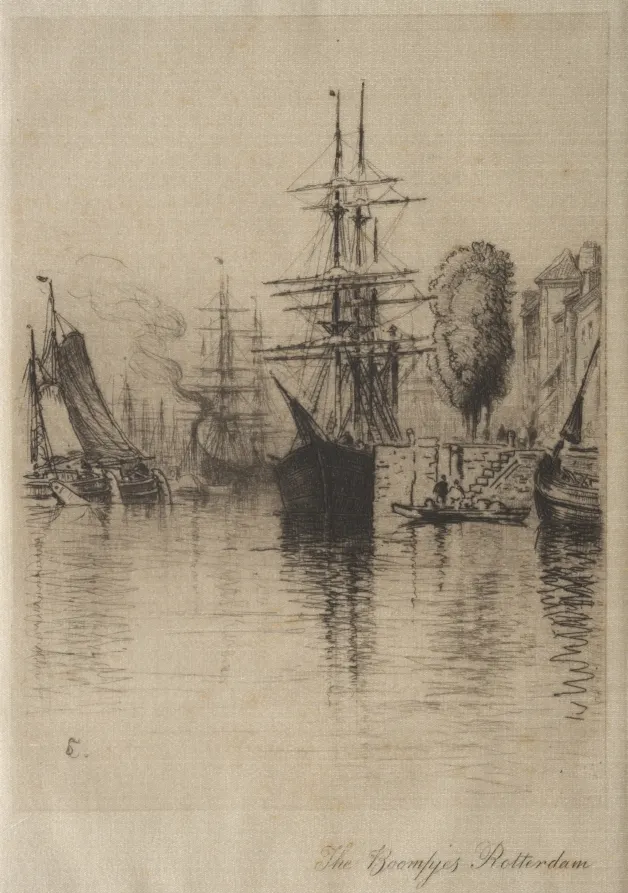
- De Amicis, Edmondo. Holland and Its People. New York: G.P. Putnam's Sons, 1885.
This is the first of three etchings created by Colman for the “Zuyder Zee Edition” of Holland and Its People by Edmondo de Amicis. (Google Books) It appears opposite page 48.
# 24. Tower de Montalban, Amsterdam
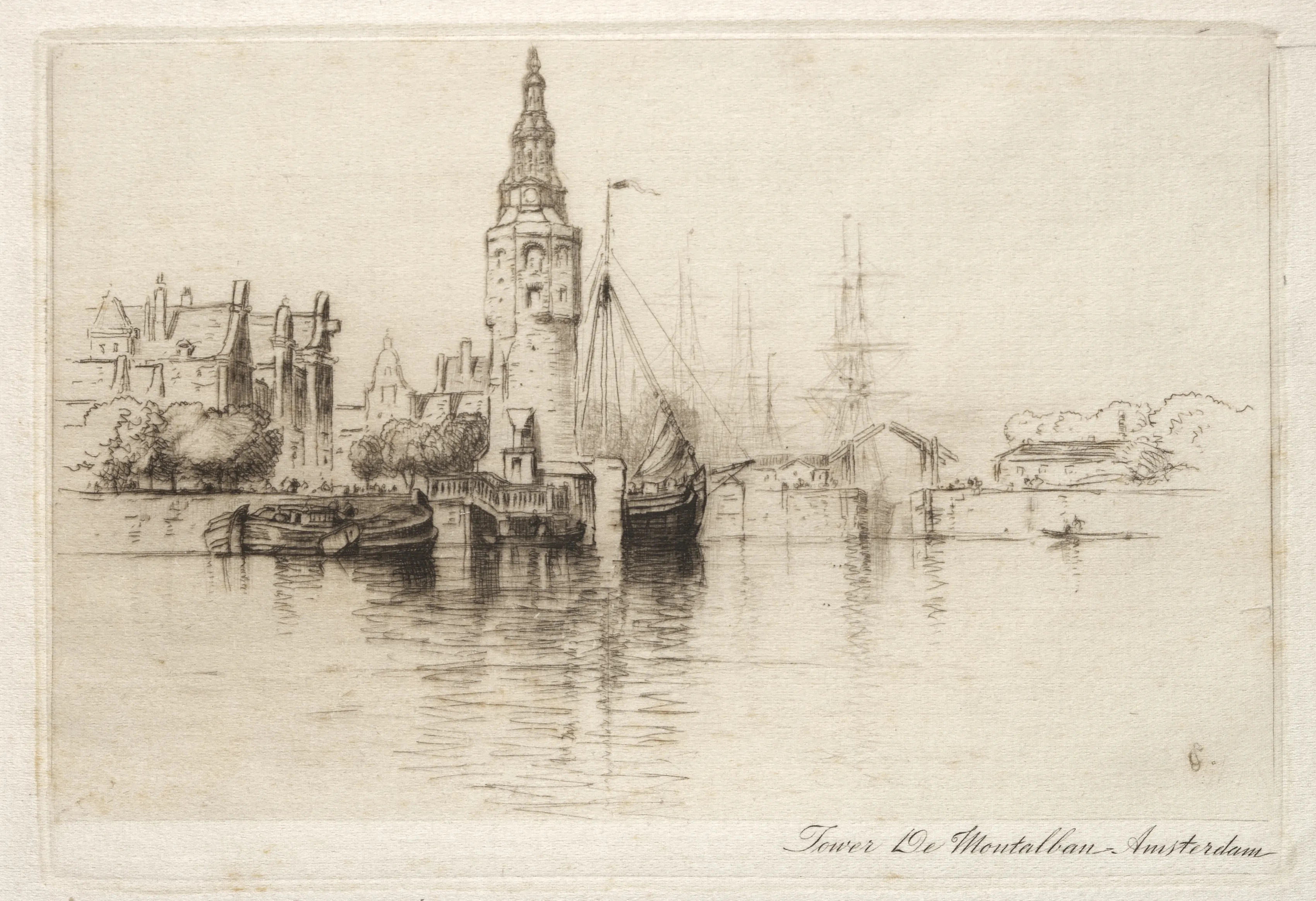
- De Amicis, Edmondo. Holland and Its People. New York: G.P. Putnam's Sons, 1885.
This is the second of three etchings created by Colman for the “Zuyder Zee Edition” of Holland and Its People by Edmondo de Amicis. (Google Books) It appears opposite page 246.
The 1891 exhibition of The New York Exhibition Club included an etching titled Old Tower at Amsterdam. This is presumed to be the same print catalogued here.
# 25. Marché Neuf, Amsterdam
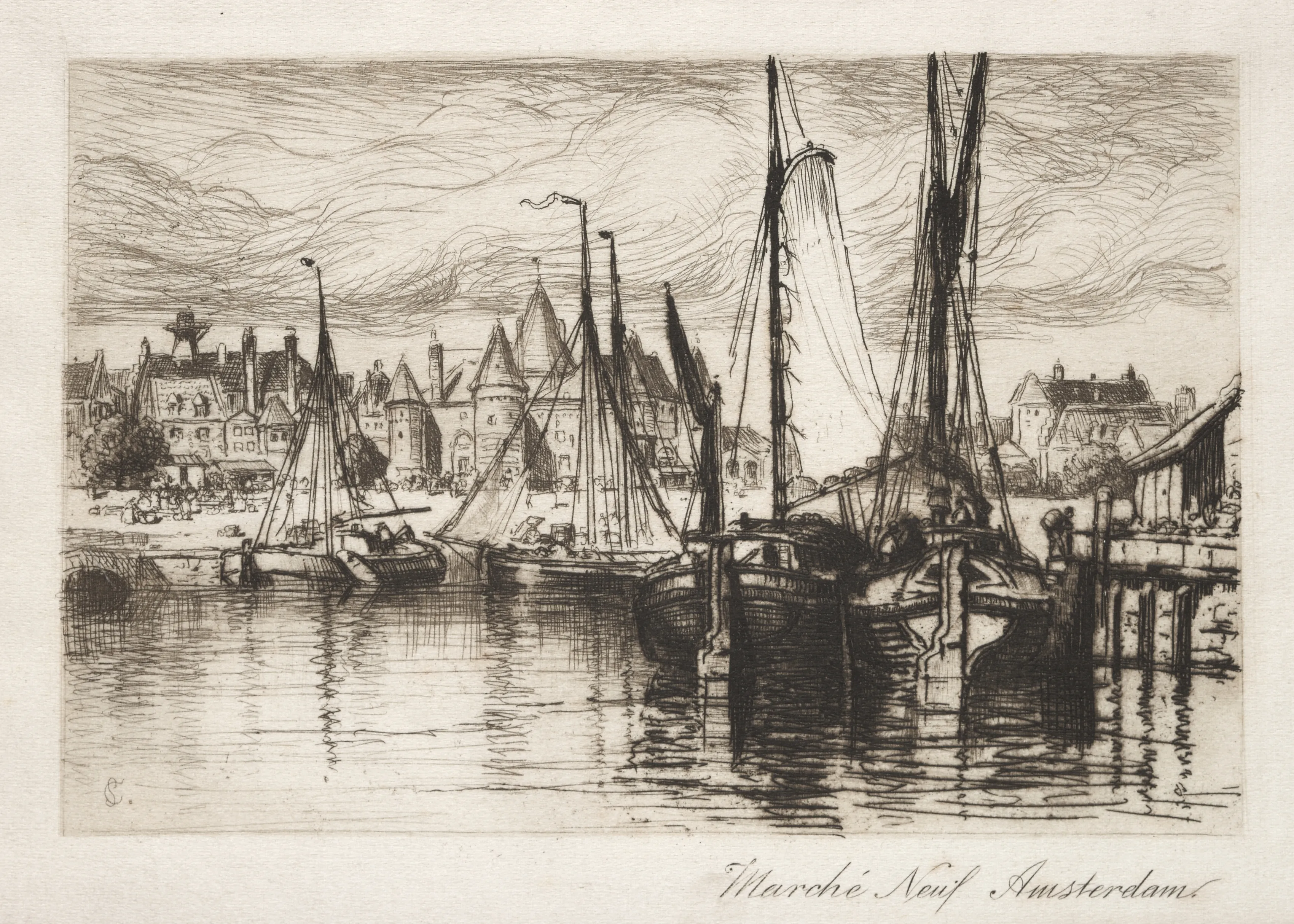
- De Amicis, Edmondo. Holland and Its People. New York: G.P. Putnam's Sons, 1885.
This is the third of three etchings created by Colman for the “Zuyder Zee Edition” of Holland and Its People by Edmondo de Amicis. (Google Books) It appears opposite page 250.
# 29. Monreale [Interior]
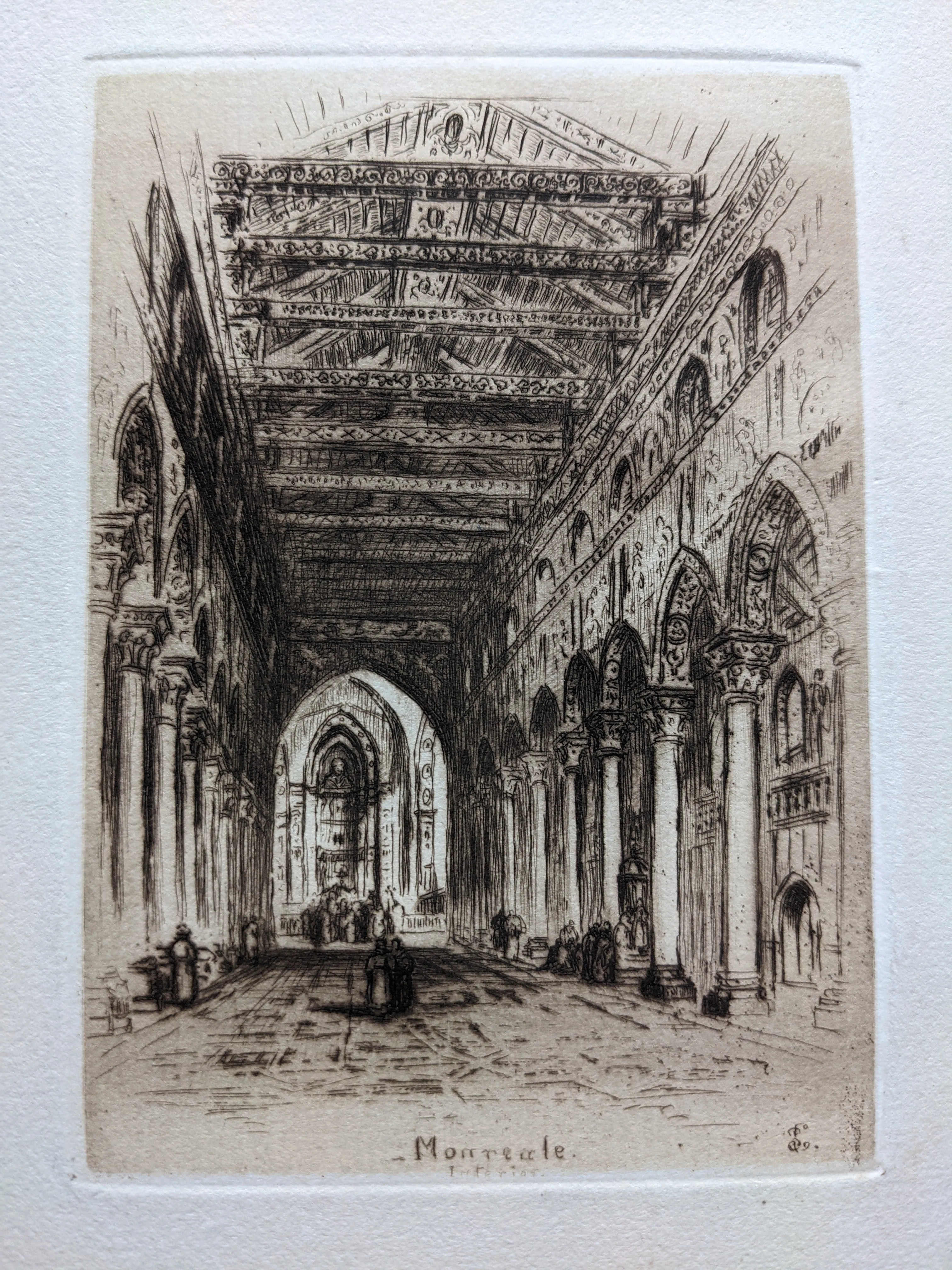
- Field, Alice Durand. Palermo: A Christmas Story. New York: G.P. Putnam's Sons, 1885.
One of five etchings published in Alice Durand Field’s Palermo: A Christmas Story. This etching serves a the frontispiece for the book.
# 28. Monreale
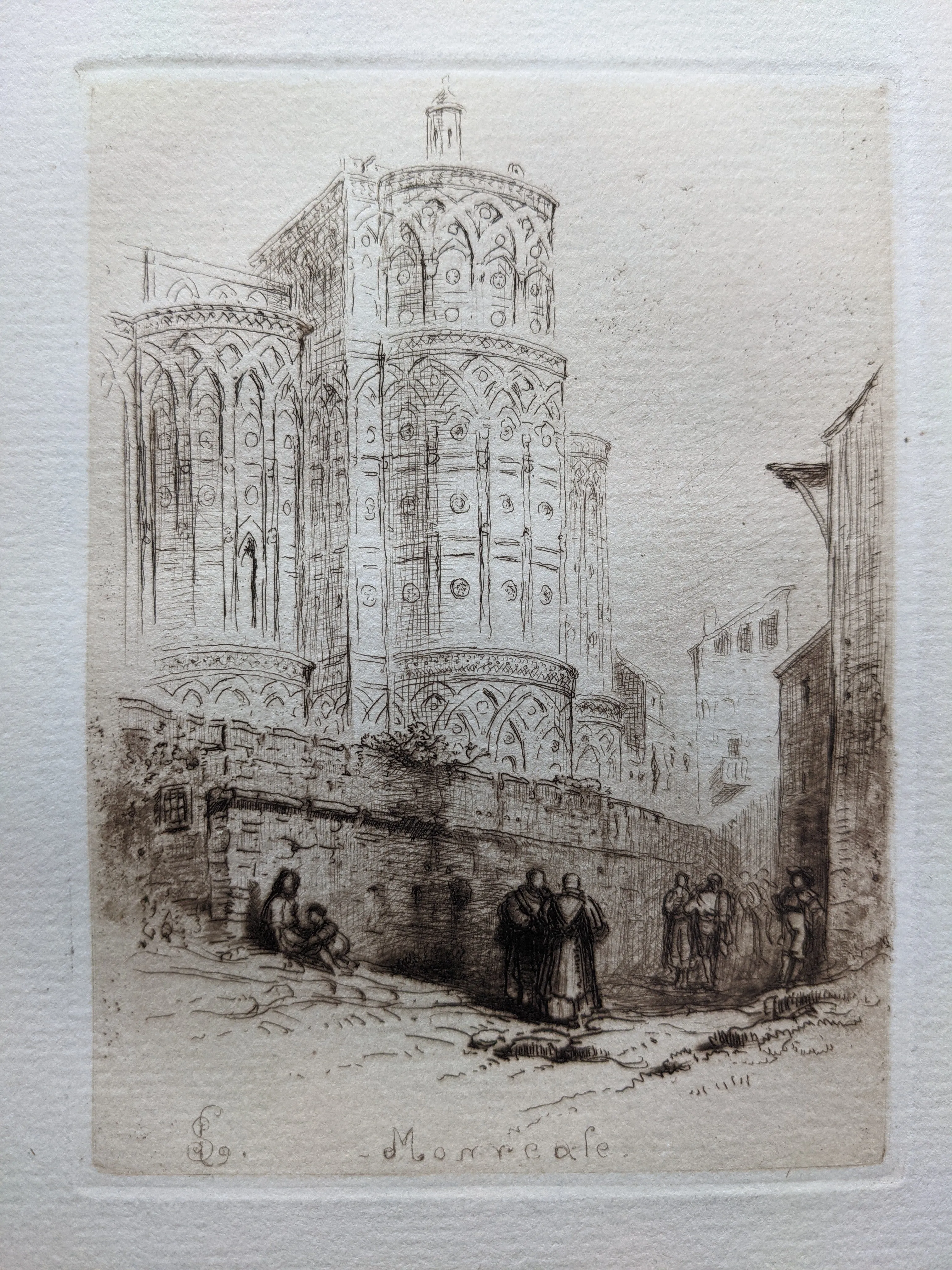
- Field, Alice Durand. Palermo: A Christmas Story. New York: G.P. Putnam's Sons, 1885.
One of five etchings published in Alice Durand Field’s Palermo: A Christmas Story. This etching appears opposite page 14.
# 30. Segeste
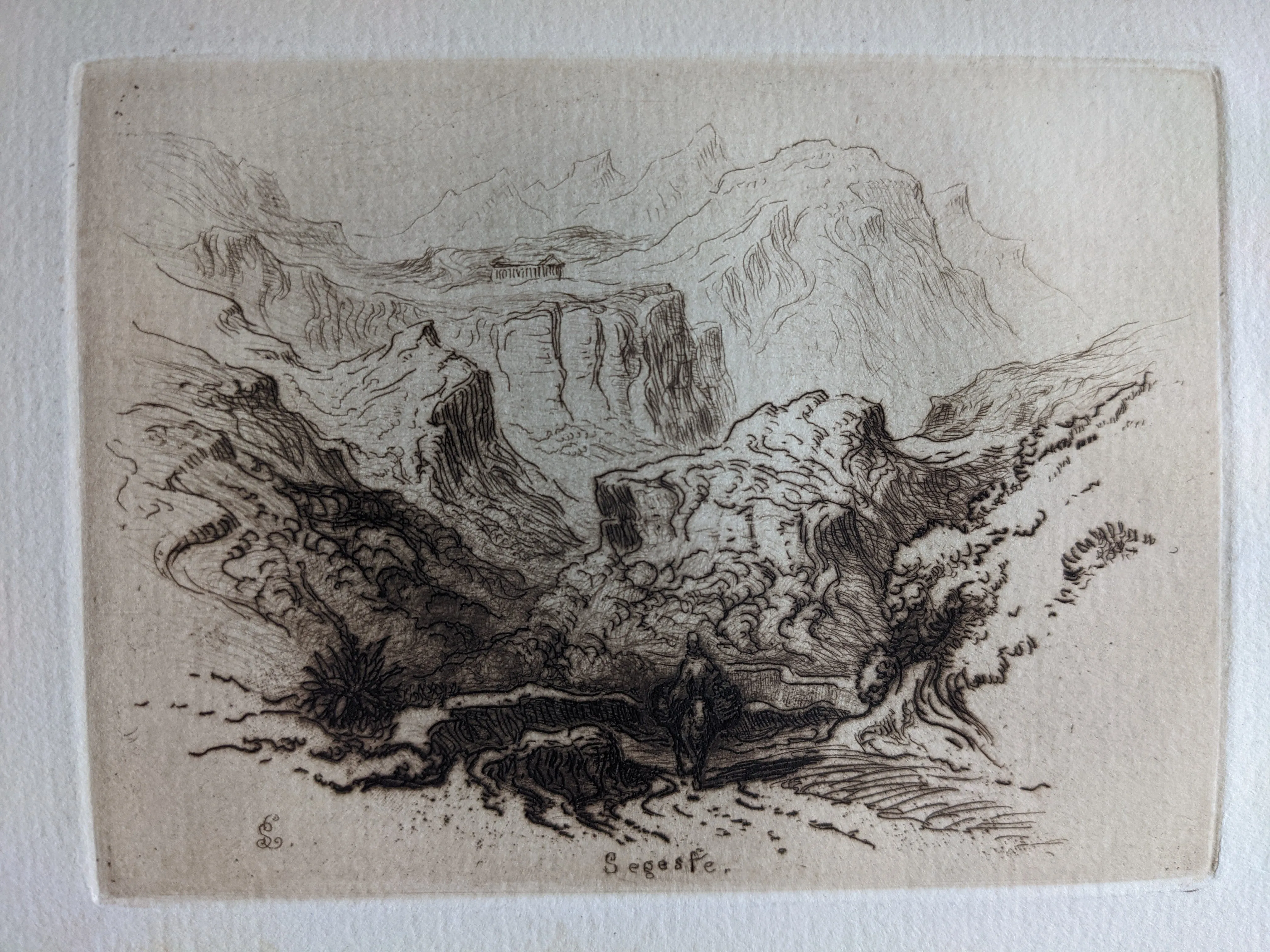
- Field, Alice Durand. Palermo: A Christmas Story. New York: G.P. Putnam's Sons, 1885.
One of five etchings published in Alice Durand Field’s Palermo: A Christmas Story. This etching appears opposite page 82.
# 27. The Convent Gate
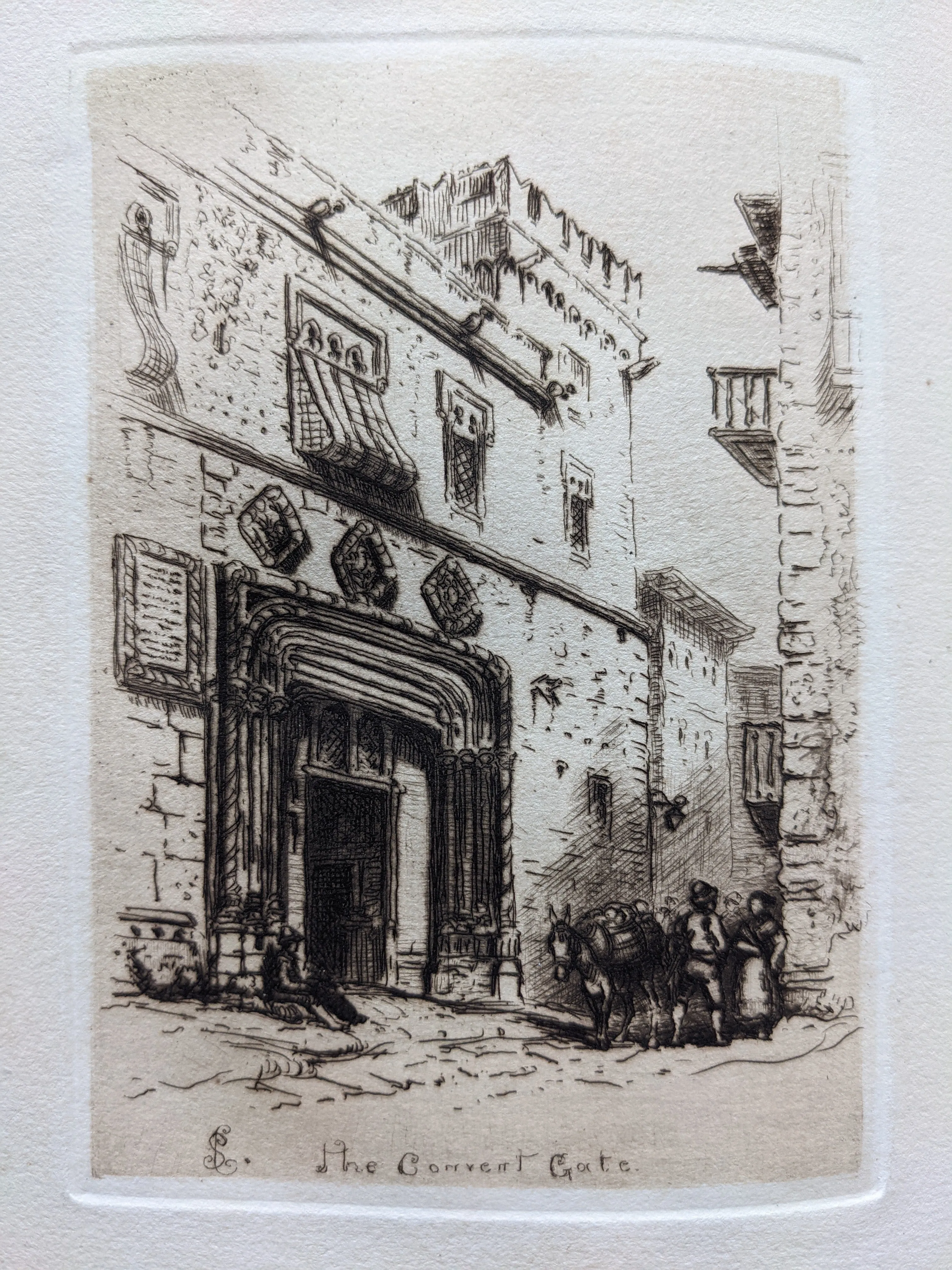
- Field, Alice Durand. Palermo: A Christmas Story. New York: G.P. Putnam's Sons, 1885.
One of five etchings published in Alice Durand Field’s Palermo: A Christmas Story. This etching appears opposite page 139.
# 26. Monte Pellegrino
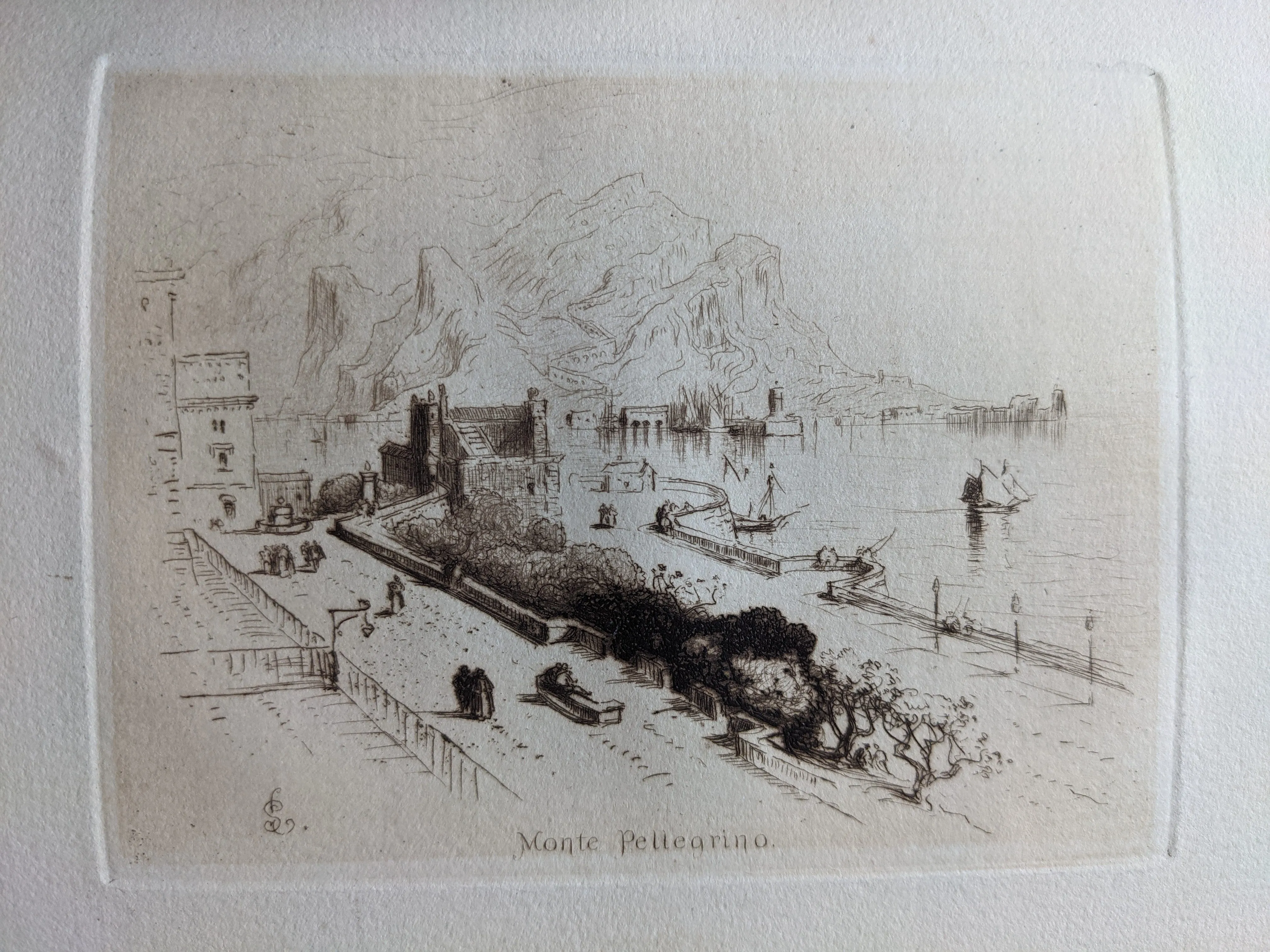
- Field, Alice Durand. Palermo: A Christmas Story. New York: G.P. Putnam's Sons, 1885.
One of five etchings published in Alice Durand Field’s Palermo: A Christmas Story. This etching appears opposite page 192.
# 34. Moorish Mills and the Guadalquivir
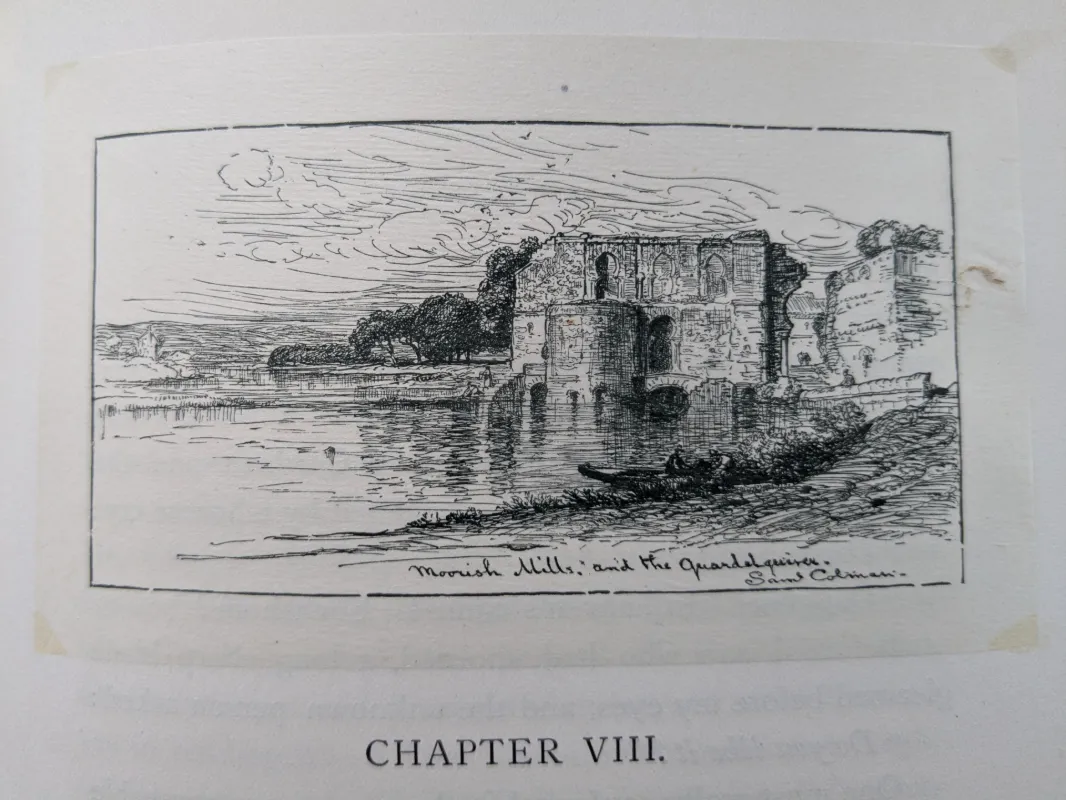
- De Amicis, Edmondo. Spain and the Spaniards. New York: G.P. Putnam's Sons, 1885.
This is the first of five etchings created by Colman for the “Guadalquivir Edition” of Spain and the Spaniards by Edmondo de Amicis. (Google Books) A proof on Japan paper was laid in on page 277.
# 35. In the Cathedral—Cordova
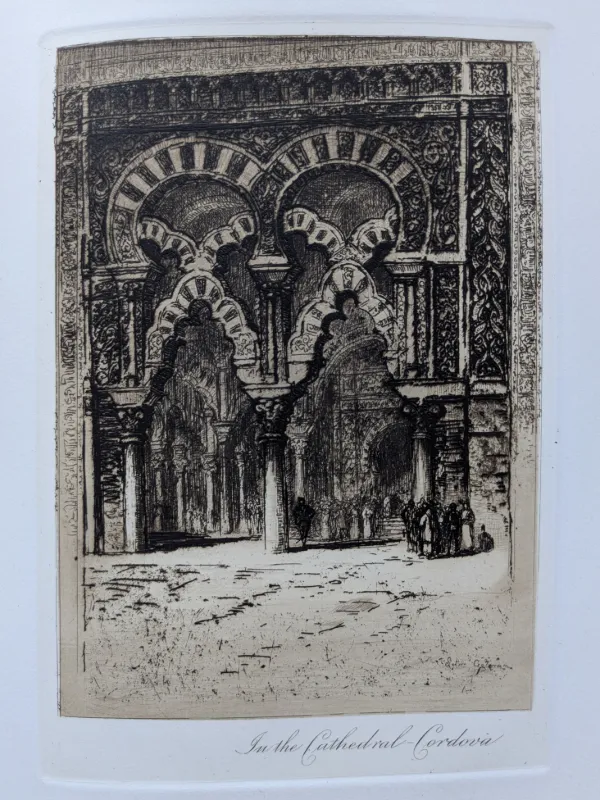
- De Amicis, Edmondo. Spain and the Spaniards. New York: G.P. Putnam's Sons, 1885.
This is the second of five etchings created by Colman for the “Guadalquivir Edition” of Spain and the Spaniards by Edmondo de Amicis. (Google Books) This etching was bound in as page 290. A a limited number of copies also included a second copy on satin.
The Syracuse University Art Museum holds a signed trial proof of this etching without the lettering.
# 36. Torre del Oro, Seville
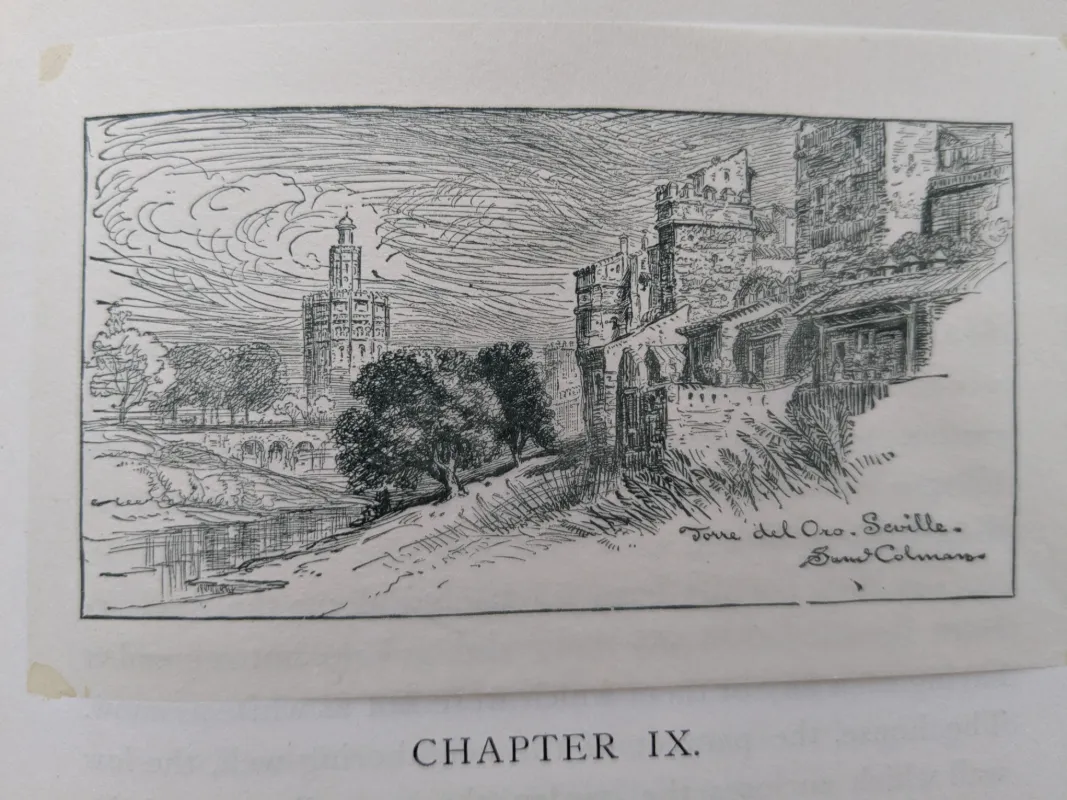
- De Amicis, Edmondo. Spain and the Spaniards. New York: G.P. Putnam's Sons, 1885.
This is the third of five etchings created by Colman for the “Guadalquivir Edition” of Spain and the Spaniards by Edmondo de Amicis. (Google Books) A proof on Japan paper was laid in on page 312.
# 37. On the Darro, Granada
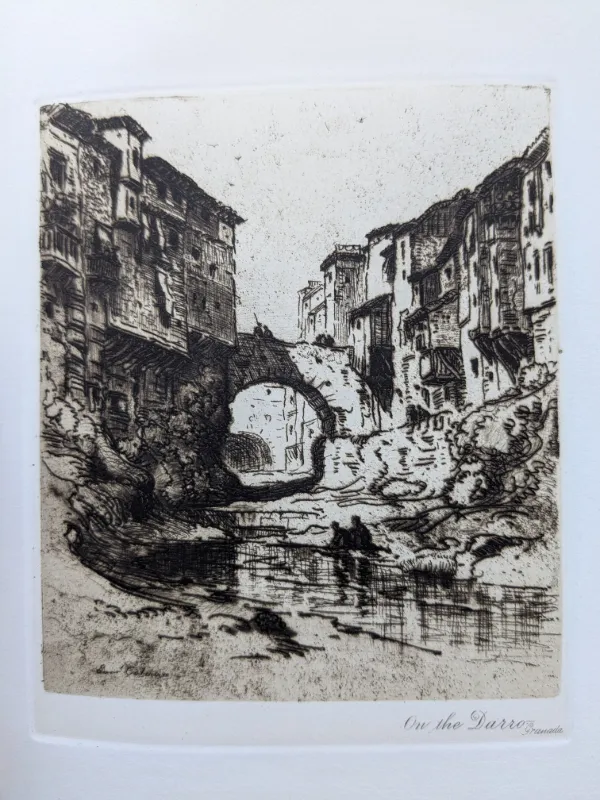
- De Amicis, Edmondo. Spain and the Spaniards. New York: G.P. Putnam's Sons, 1885.
This is the fourth of five etchings created by Colman for the “Guadalquivir Edition” of Spain and the Spaniards by Edmondo de Amicis. (Google Books) This etching was bound in as page 396. A a limited number of copies also included a second copy on satin.
The preeratory sketch for this etching is held at the Cooper Hewitt.
A proof, before lettering, unsigned but inscribed in Colman’s hand has also been seen for sale online.
# 38. Entrance to Valencia
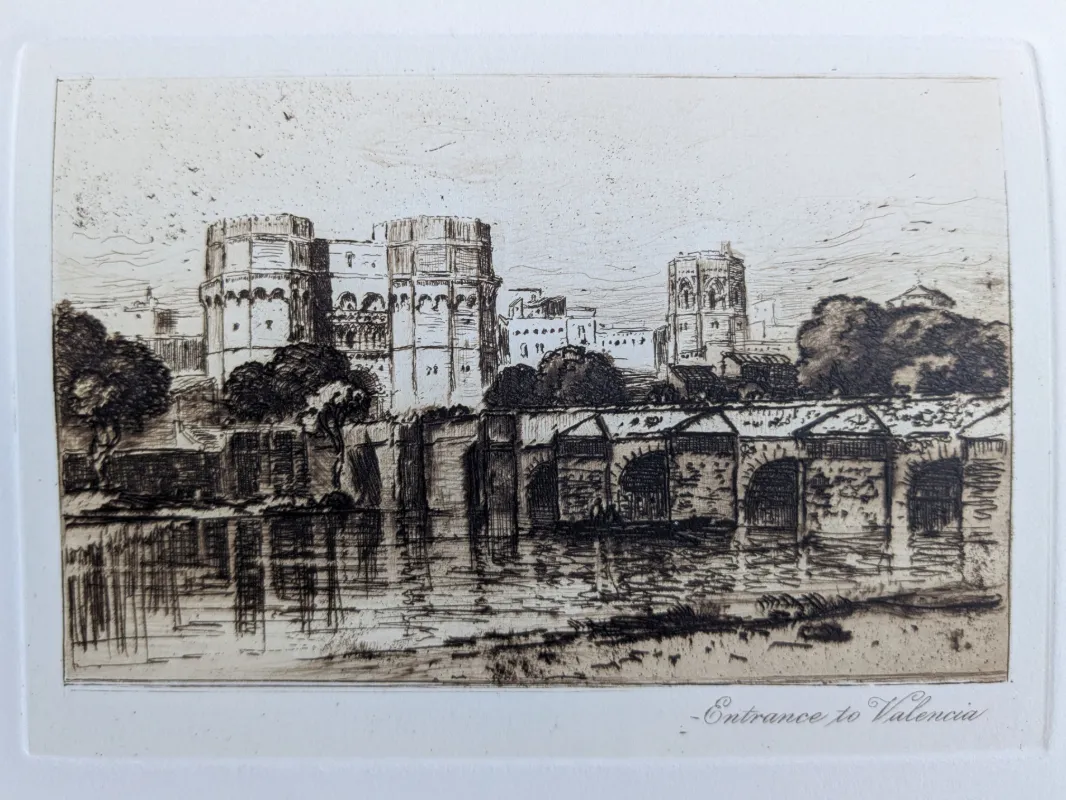
- De Amicis, Edmondo. Spain and the Spaniards. New York: G.P. Putnam's Sons, 1885.
This is the fifth of five etchings created by Colman for the “Guadalquivir Edition” of Spain and the Spaniards by Edmondo de Amicis. (Google Books) This etching was bound in as page 450. A a limited number of copies also included a second copy on satin.
# 32. Untitled [Swamp Landscape]
This etching is known through a single proof in the Syracuse University Art Museum. That proof has Colman’s edits in brown ink. It’s unknown if any subsequent states exist that incorporate these changes.
# 33. Untitled [Church Between Trees]
# 50. The Tower of Comares, Alhambra, Spain

- Irving, Washington. Irving's Works: Geoffrey Crayon Edition. Vol. 5, The Alhambra. Author’s rev. ed. New York: G.P. Putnam’s Sons, 1886.
This etching was used as the frontispiece of a scarce 1886 edition of Washington Irving’s The Alhambra.
# 39. Cypress Trees of Point Lobos, California
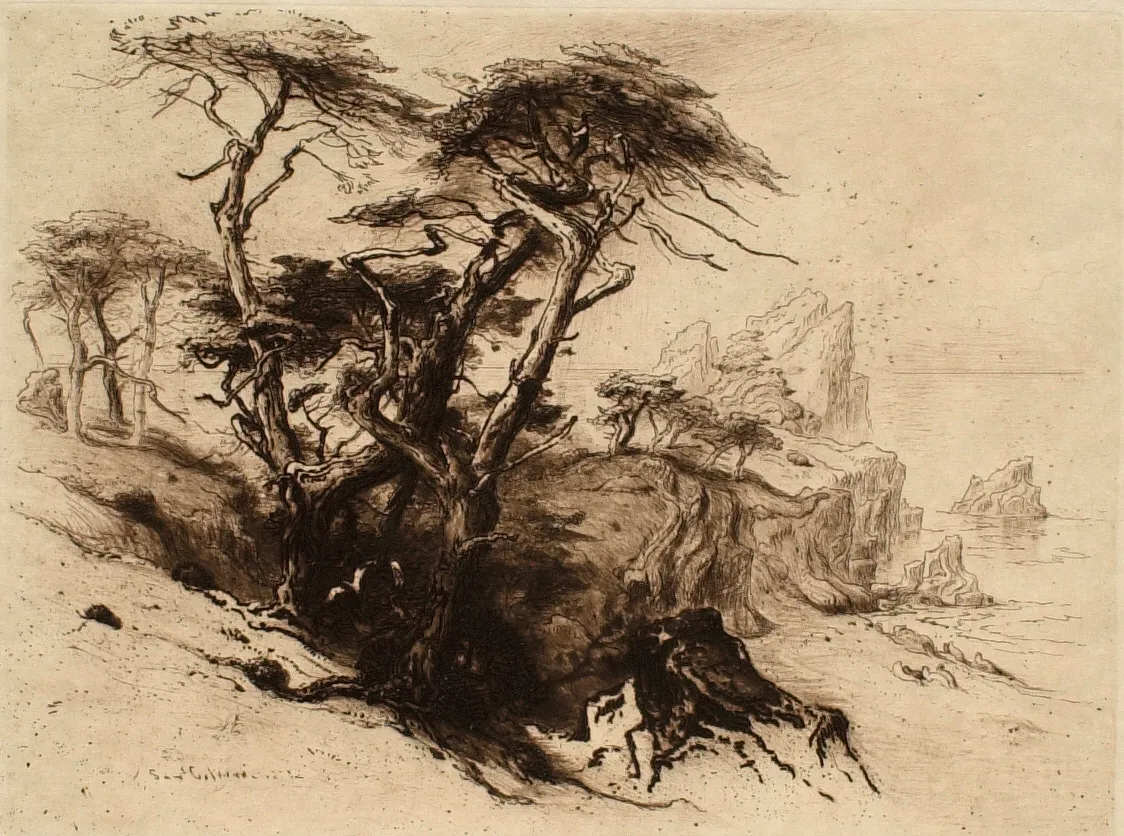
- Clark Art Institute
- National Academy of Design
- Rhode Island School of Design Museum
- Portland Museum of Art
The National Academy of Design refers to this etching as “Trees Looking Toward Water.” The origins of this name are unclear.
# 40. Ruins of a Mosque, Tlemcien, Algeria
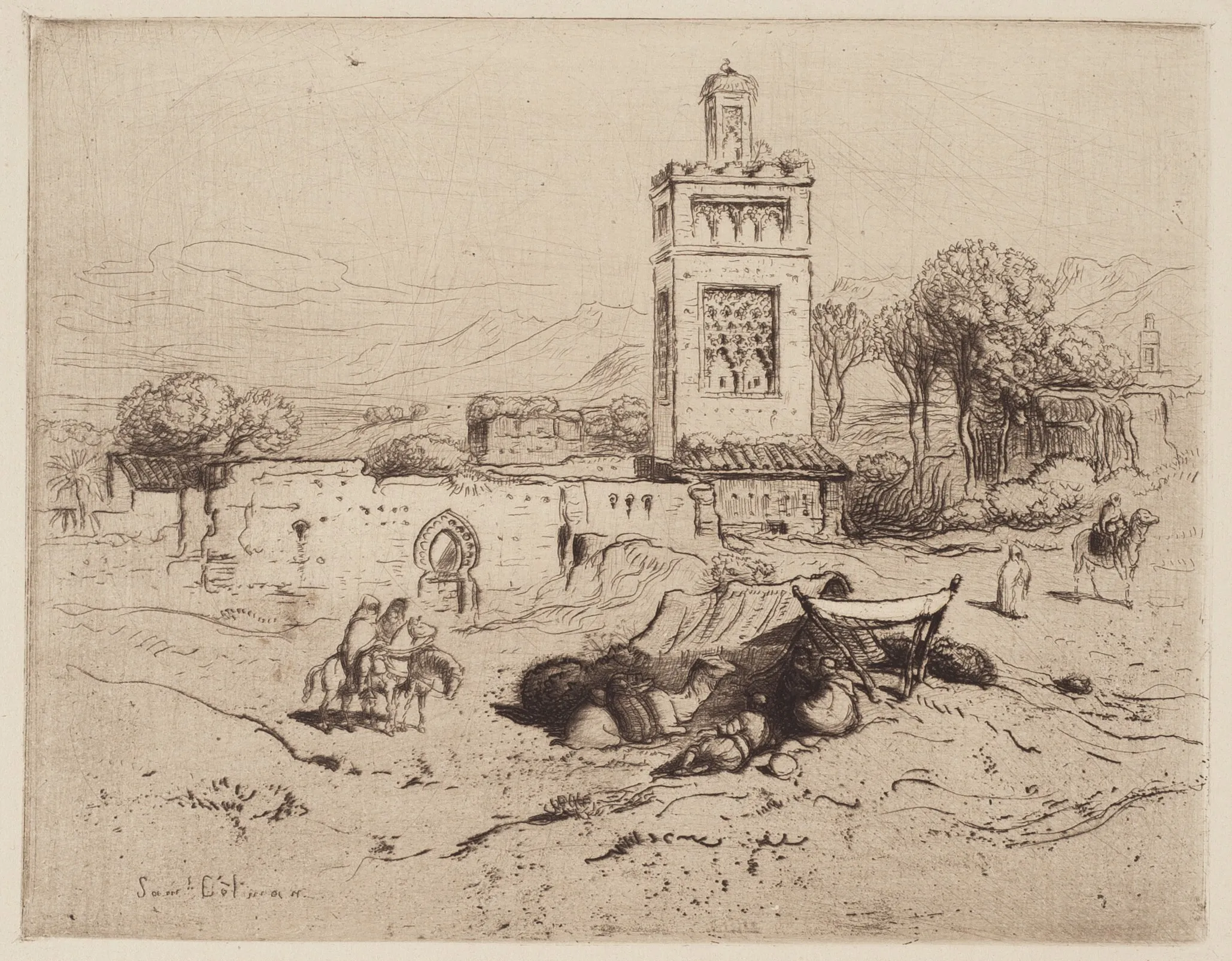
- Catalogue of the the New York Etching Club Exhibition at the National Academy of Design. New York: 1887.
- Fine Arts Museums of San Francisco
- High Museum of Art
- Metropolitan Museum of Art
- National Gallery of Art
# 53. An Old Moorish Mosque
This etching is listed in the catalogue of a 1981 sale of Colman’s work at the Barridoff Galleries. (Samuel Colman: East and West from Portland) There it is identified as “Etching, First State (2 only taken).” It is unclear if this print was ever finished or if the two proofs mentioned here represent all that were ever printed. Most of the works in this sale came directly from the artist’s estate.
# 44. Mountain Form from the Gemini Pass
This etching is listed in the catalogue of a 1981 sale of Colman’s work at the Barridoff Galleries. (Samuel Colman: East and West from Portland) There it is identified as “Etching, First State (2 only taken).” It is unclear if this print was ever finished or if the two proofs mentioned here represent all that were ever printed. Most of the works in this sale came directly from the artist’s estate.
The subject of this etching is probably Mount Gemini, in Fresno County, CA. Though the Barridoff catalogue does not date the work, it is likely circa 1888, when Colman traveled to California and produced many drawings of the Sierra Nevada mountains.
# 41. Conway Castle
According to the collection catalogue for the Rona and Martin Schneider Collection of European and American Prints at the Syracuse Univeristy Art Museum, this print was published by the Society of American Etchers in 1890. No further documentation has been located and no other copies of this print are known.
# 42. Kew, England
- A Publication by the New-York Etching Club: With Catalogue of Etching Proofs Exhibited at the National Academy of Design, New York, February, 1891. New York: De Vinne Press, 1891.
# 45. Life in Mexico (From note book sketches.)
This etching is listed in the catalogue for the World’s Columbian Exposition of 1893. No additional information is given, however, Colman traveled to Mexico in 1892, making it likely the etching was produced around the same time as it was exhibited.
# 43. Old Cedars, Pike's Peak
This etching is illustrated in American Etchings of the Nineteenth Century: 115 Prints) and credited to the collection of Patricia Carroll Fitzgerald Mandel. No other copies are known. Many of Ms. Mandel’s prints are now in the Rhode Island School of Design Museum, however, this print is either not amongst them or has not been catalogued.
Though Colman would live another 20 years, this is presumed to be the last etching he created. His artistic output declined dramatically in the final two decades of his life. In those years he wrote two, largely-forgotten books on art theory, married for a second time, and fathered his first child at the age of 76.